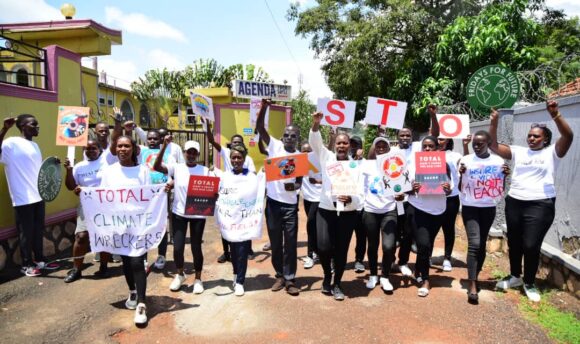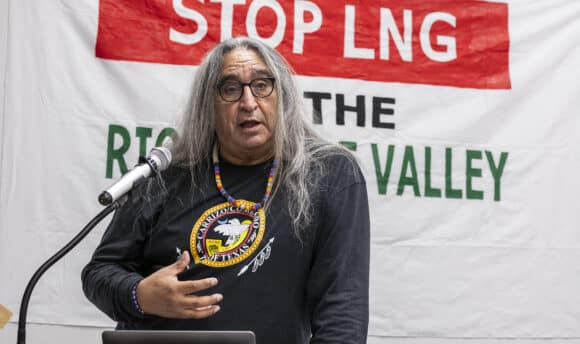Why do insurance companies matter in the climate crisis?
Customers pay premiums to insurers for protection and to secure the right to compensation for potential damages or losses to assets. For the insurer, the premiums are capital that can be reinvested in projects that generate profits, which allows them to pay customers’ claims and make a profit.
Just like we insure our homes and cars, corporations operating fossil fuel facilities also need insurance. Due to its risks of accidents, large-scale constructions including the construction of fossil fuel facilities are typically required to have insurance to obtain permits from public authorities or secure financing from banks. By providing support for fossil fuel projects, insurers and banks are accelerating the climate crisis.
This blog highlights the role of insurance companies in climate change, focusing on SOMPO’s involvement in the Rio Grande LNG project as a case study.
What is the Rio Grande LNG Project?
Rio Grande LNG is a Liquefied Natural Gas (LNG) export terminal under construction in southern Texas, USA. Several Japanese companies are involved in this project, including MUFG and Mizuho providing financing, and Itochu Corporation signing long-term LNG purchase agreements. If Rio Grande proceeds, the LNG produced will likely be imported to Japan.
Local residents are concerned about this project because it could harm their health and environment, it violates Indigenous rights, and will worsen climate impacts.
Impact on Climate Change from Greenhouse Gas Emissions
LNG has been touted as a ‘cleaner’ fossil fuel with lower greenhouse gas (GHG) emissions. However, studies reveal that LNG’s climate impact could be up to 24 times greater than coal, taking into account its entire lifecycle from production to supply and transportation. Rio Grande LNG’s annual CO2 emission is estimated to be 163 million tons across its lifecycle, equivalent to the emissions from 44 coal-fired power plants.
NextDecade, the operator of the project, claims that CO2 emissions can be reduced by 90% in the gas cooling process via the use of Carbon Capture and Storage (CCS). However, it is said that emissions during the gas cooling process account for only 6-7% of the total lifecycle CO2 emissions. Therefore, the emissions mitigated by CCS are only a fraction of the total lifecycle emissions and the overall emissions of the project will significantly deter us from achieving global climate goals and staying below 1.5oC.
Violations of Indigenous Peoples’ Rights
The proposed Rio Grande LNG site is adjacent to the Garcia Pasture, a sacred site to the Carrizo/Comecrudo Tribe.
Juan Mancias, the chairman of the Tribe, is actively engaged in global campaigns to protect his people’s sacred site from the proposed LNG facilities. He has traveled to Europe with fellow Indigenous leaders, advocating for customers and funders to stop supporting the construction of the Rio Grande LNG. According to local civil society groups, NextDecade has never held a consultation meeting with Indigenous Peoples on the Rio Grande LNG project and has not obtained the Free, Prior, and Informed Consent (FPIC) required by the United Nations.
“LNG export terminals in the U.S. exploit Indigenous, Latino and Black communities, exacerbate the climate crisis and worsen air pollution in Europe.” Indigenous communities propose that by speeding up the buildout of renewable energy sources, European governments can cut the need for importing LNG from Texas.
“When you steal the land, you’re stealing us. And you’re taking away our identity, because you fence it off and you don’t allow us into the land where our ancestors are buried, where we remember our ceremonies and rituals.” said Mancias in an interview.
SOMPO’s Involvement in Rio Grande LNG
In February 2024, a report by the Rainforest Action Network and Public Citizen revealed that one of major property and casualty insurers: SOMPO, as an underwriter of Rio Grande LNG. This information was obtained through Freedom Of Information Act requests.
Since last year, Insure Our Future and local communities have been negotiating with SOMPO to stop underwriting Rio Grande LNG project. However, SOMPO has yet to announce its withdrawal from this project. We urge SOMPO to adopt a new fossil fuel policy including the following:
- Commit not to renew the next contract with Rio Grande LNG,
- Introduce a conventional oil and gas policy, and
- Introduce a FPIC policy to make sure its clients protect the rights of Indigenous communities.
What Can We Do?
So, what can we do as individuals to stop the environmental destruction and human rights violations caused by the Rio Grande LNG project? The Rainforest Action Network currently has an online petition to demand Rio Grande insurers, including SOMPO, not to renew the contract.




